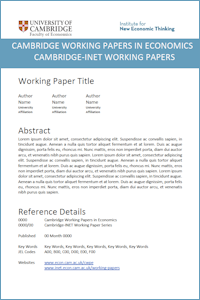
Ajzenman, N., Cavalcanti, T. and Da Mata, D.
More than Words: Leaders' Speech and Risky Behavior During a Pandemic
CWPE2034
Abstract: How do political leader's words and actions affect people's behavior? We address this question in the context of Brazil by combining electoral information and geo-localized mobile phone data for more than 60 million devices throughout the entire country. We find that after Brazil's president publicly and emphatically dismissed the risks associated with the COVID-19 pandemic and advised against isolation, the social distancing measures taken by citizens in pro-government localities weakened compared to places where political support of the president is less strong, while pre-event effects are insignificant. The impact is large and robust to different empirical model specifications, and definitions of political support and events. Moreover, we find suggestive evidence that this impact is driven by localities with relatively higher levels of media penetration, municipalities with presence of active Twitter accounts, and municipalities with a larger proportion of Evangelic parishioners, a key group in terms of support for the president.
Keywords: Health, Coronavirus, Leadership, Persuasion, Risky Behavior
JEL Codes: D10 I31 Z13
Author links: Tiago Cavalcanti
PDF: https://www.econ.cam.ac.uk/research-files/repec/cam/pdf/cwpe2034.pdf 
Open Access Link: https://doi.org/10.17863/CAM.57994
COVID-19 Economic Research Special Feature: Do Leaders' Words and Example Affect Citizens' Risky Behaviour During the Pandemic?
Published Version of Paper: More than Words: Leaders' Speech and Risky Behavior During a Pandemic, Ajzenman, N., Cavalcanti, T. and Da Mata, D
, American Economic Journal: Economic Policy (2023)
<< CWPE Home | CWPE List 2020 >>
